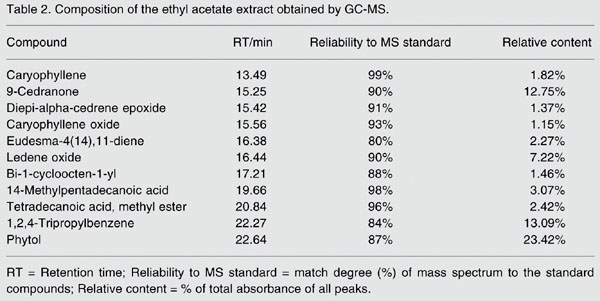The cytotoxicity of three extracts (petroleum ether, ethyl acetate and n-butanol) from a plant used in folk medicine, Marchantia convoluta, to human non-small cell lung carcinoma (H1299) and liver carcinoma (HepG2) cell lines was tested. After 72-h incubation of lung and liver cancer cell cultures with varying concentrations of extracts (15 to 200 µg/mL), cytotoxicity was determined by the 3-(4,5-dimethylthiazol-2-yl)-2,5-diphenyltetrazolium bromide assay and reported in terms of cell viability. The extracts that showed a significant cytotoxicity were subjected to gas chromatography-mass spectrometry analysis to identify the components. The ethyl acetate, but not the petroleum ether or n-butanol extract, had a significant cytotoxicity against lung and liver carcinoma cells with IC50 values of 100 and 30 µg/mL, respectively. A high concentration of ethyl acetate extract (100 µg/mL) rapidly reduced the number of H1299 cells. At lower concentrations of ethyl acetate extract (15, 30, and 40 µg/mL), the numbers of HepG2 cells started to decrease markedly. Gas chromatography-mass spectrometry analysis of the ethyl acetate extract revealed the presence of several compounds such as phytol (23.42%), 1,2,4-tripropylbenzene (13.09%), 9-cedranone (12.75%), ledene oxide (7.22%), caryophyllene (1.82%), and caryophyllene oxide (1.15%). HPLC analysis result showed that there were no flavonoids in ethyl acetate extract, but flavonoids are abundant in n-butanol extract. Further studies are needed regarding the identification, toxicity, and mechanism of action of active compounds.
Marchantia convoluta extract; Cytotoxicity assay; HepG2 and H1299 carcinoma cell lines; Phytol; Caryophyllene oxide




